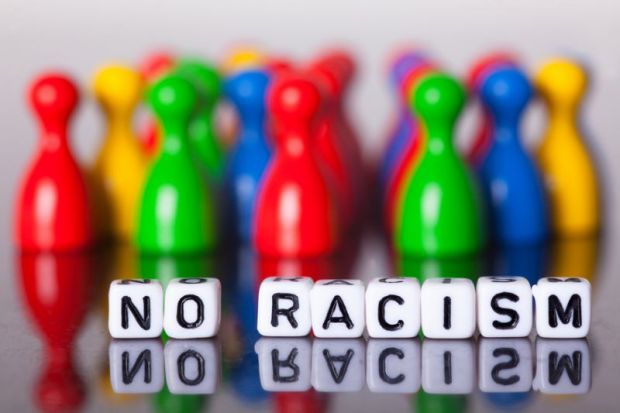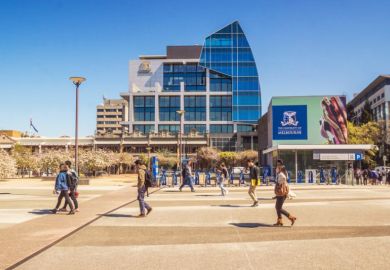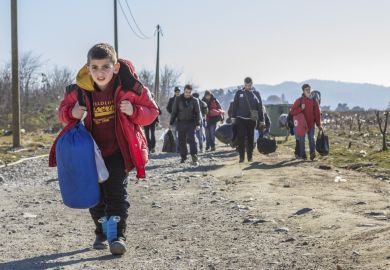A year ago, racial incidents and lingering tensions on many campuses in the US turned into protests in October that spread nationally in November.
This year, incidents have multiplied at the very beginning of the academic year. And so have protests. Some of the incidents are closely tied to campus issues. But many reflect the protest movement – which extends well beyond campuses – against police shootings of unarmed black men.
Many students are joining that movement, and in particular the calls of some not to stand during the playing of the national anthem before athletic events. And some of the racist incidents involve attacks on Black Lives Matter, frequently invoking the name of the movement along with racist images.
Here are some of the incidents:
- At the University of North Dakota last week, students posted photographs of themselves in blackface to social media twice in a 48-hour period. In one image, the students added a reference to Black Lives Matter. The university is investigating whether the posts violate any rules. Mark Kennedy, president of the university, issued a statement that said in part: "I am appalled that within 48 hours two photos with racially charged messages have been posted on social media and associated with the UND campus community. It is abundantly clear that we have much work to do at the University of North Dakota in educating our students, and the entire university community on issues related to diversity, inclusion, and respect for others."
- Also this month, Kansas State University and Quinnipiac University students posted photographs of themselves in blackface, prompting campus debates and denunciations.
- At the University of Mississippi, students held a sit-in for several hours in the main administration building to demand a reaction from the university to a student's tweet in response to the protests in Charlotte, North Carolina, over the police shooting of a black man. The student tweeted of those protesting: "I have a tree with room enough for all of them, if you want to settle this Old West Style." Chancellor Jeffrey S. Vitter, whom some students criticised for not immediately calling the tweet racist, issued a statement that said in part: "To be clear, we condemn the recent social media post by one of our students that referenced lynching. In light of our country’s history, that comment can only be seen as racist, offensive and hurtful, especially to members of our African American community. There is no place in our community for racist or violent acts."
- San Jose State University officials are investigating two incidents involving graffiti with swastikas and "hateful language" in two separate incidents in dormitories. One of the swastikas was drawn next to the words "Admit One Jew". President Mary Papazian sent a message to the campus condemning the incidents and outlining a series of meetings being held about what had happened.
- At Ohio University, a "free speech" wall where students may write what they want was the site of controversy last week when students found on the wall the words "Build the Wall" (an apparent reference to one of Donald Trump's campaign promises) and a drawing of a person hanging in a noose from a tree. Photos of the wall quickly spread on social media. Under university policy, the wall is "unregulated" unless there is "a specific threat of physical harm". The university issued this statement about the images that appeared last week: "Paint may be able to cover offensive messages and reprehensible images, however, it will never conceal our underlying societal problems. We must purposely work to understand and accept one another in order to address conflicts. Our most fundamental responsibility as an institution of higher education is to promote inquiry and learning. It is our intent that the Graffiti Wall will continue to teach our university community that words and images are powerful."
- At the University of Dayton last week, a racial slur appeared on the door of a room of two black students. Eric F. Spina, the president, condemned this action. In an email message to the campus, he said that "this behavior is simply not acceptable and will not be tolerated". He added that "we will continue to investigate and will hold those responsible accountable for this action".
- At the State University of New York at Brockport, officials are investigating how the words "niggers deserve to die" were written on a whiteboard in a dormitory that houses many minority students. In response, Heidi Macpherson, the Brockport president, sent a message to all students and faculty members condemning what had happened, reporting that an investigation was taking place, and saying that campus discussions would be scheduled to discuss hate speech.
- A freshman at Belmont University ceased to be enrolled last week – after he posted a racist photo on Snapchat, labelling three National Football League players with the N-word.
- At American University last week, hundreds of black students held a protest over racist incidents. The rally was organised after two black women reported incidents involving bananas – one thrown at a woman and one left outside the door of a woman. Students carried signs saying "Racism at AU Is Bananas".
- At Eastern Michigan University, the letters KKK and racial slurs were found on several buildings last week, prompting protests and condemnations by university officials.
Protests During Athletic Events
Eastern Michigan students took to the field Friday night at a home football game to continue the protest over the racial slurs.
In the video below, the protest can be seen, starting at about 1:19.
James M. Smith, president of Eastern Michigan, issued a statement after the protest defending the right of students to rush on to the field after the game. He noted that university had worked to make sure this could happen in a secure way for the students in the protest and for the athletes and others on the field. "We have great respect for our students engaged in the constructive efforts underway to address the issues we face, and we strongly defend and support the right of students to peacefully demonstrate about issues important to them," Smith said.
In recent weeks, college athletes and cheerleaders have joined the movement started by Colin Kaepernick, the National Football League quarterback, to drop to one knee during the national anthem, seeking to draw attention to cases of racial oppression and police brutality.
At Southern Methodist University, several African American members of the band – while playing the national anthem – dropped to their knees. Some students watching the game did the same.
4 #SMU band members take a knee while playing national anthem tonight vs. TCU #ESPN #ponyuptempo pic.twitter.com/epW7ml2M9U
— Rattle & Hum Sports (@CowboyCamp) September 24, 2016
On Saturday, football players at both Michigan State University and the University of Michigan (in separate games) raised their fists during the national anthem.
Possibly 7 Michigan football players raised their fists in protest of police killing blacks before today's game https://t.co/JmhTlzxnjH pic.twitter.com/3SdIyiLrMX
— nadeltanz (@nadeltanz) September 24, 2016
Several football players at the University of Nebraska at Lincoln took a knee during the national anthem before their game.
And on Saturday, members of the Black Student Union at Temple University declined to stand during the national anthem at the university's football game, and said that they would not do so for the rest of the season. A statement from the group said that their refusal to stand reflects "our discontent with the justice system and the state of our country".
Many fans and students at the football game of Morgan State University, a historically black institution, either sat or raised their fists during the national anthem.
Flags and marches
Several campuses have been taking steps to try to express solidarity with those protesting the police shootings of black men.
The University of Vermont, at the request of the student government there, on Friday put up a Black Lives Matter flag, along with the flags of the United States and Vermont. A statement from the student government president, Jason Maulucci, said that the flag was meant as gesture of solidarity at a time that "so many are struggling with the violence and search for justice in this country".
The university posted a photo of the flags to Facebook, where many posted comments that were highly critical of UVM, calling it, for example, "a college with a majority of self-loathing white students".
Some expressed shock at how much criticism the university received (although many of the comments appear to come from people with no connection to the university).
And some praised the university. "Thank you for having the courage to support communities of color," wrote one person. "At a time when so many are feeling increasingly vulnerable to violence, it makes a difference for UVM to be actively creating a safe space and necessary dialogue. Communities are in pain. Empathy goes a long way towards building understanding."
Many of the protests have demanded more participation from administrators in the cause of racial justice. At Elon University on Friday, the Black Student Union organised a silent march, in which participants marched through the campus, not saying a word, to protest the recent police shooting in Charlotte, N.C., and other such shootings of black men.
Many white students joined the march, as did President Leo Lambert, Provost Steven House and several other senior administrators.
More attention – on campus and off
In an interview, Shaun R. Harper, executive director of the Center for the Study of Race and Equity in Education at the University of Pennsylvania, said it was important to remember that racist incidents on campus – just like police shootings of black men – are not new.
Harper's centre conducts interviews with students – of all races and at all kinds of colleges – about race relations. "The racial ugliness on campuses and on social media in recent weeks are not new," he said. "White students did not just suddenly start painting the N-word and other racial epithets on black peers’ residence hall doors and on ethnic cultural centers. This has been occurring for many, many years."
What's different, he said, is that students are using social media and other creative forms of protest to attract attention. Similarly, he said, the Black Lives Matter is using video and social media to draw attention to police shootings of black men – also something that has been going on for a long time.
Students have learned from the movement, he said. "Students on predominantly white campuses can now distribute their own photos and videos for the world to see," he said. "They no longer have to wait for their campus newspapers to publish stories that may only get local coverage."
Kimberly A. Griffin, an associate professor of higher education at the University of Maryland at College Park who studies the campus racial climate, agreed that these incidents are not a new phenomenon (even if social media have changed the way people experience and spread the word about campus racism). "I think it's really important that folks know that we have a couple of decades of research that shows that the stereotyping, the name calling, the doubts of their academic abilities, the questions about whether racism really exists," Griffin said via email. "These things have been consistent and persistent in the lives of students of color."
At the same time, however, Griffin added that "I do think that this is a unique moment".
She explained: "Our national narrative is that the US is a fair place where everyone has an equal chance to be great. What we are seeing on TV and on our computer screens is almost the exact opposite of what we say we are.
"While racism and violence against black bodies aren't new, I think that social media and technology are forcing people who may have thought that people were making up or overstating their experiences to actually see what is happening. At the same time, college campuses are getting more and more diverse, and students of color are demanding that these spaces be welcoming and inclusive for them.
"Again, these are things that student activists have demanded for decades, but perhaps larger populations of black and [other ethnic minority] students and access to technology and social media make these demands feel louder than they have been."
This is a version of an article that first appeared on Inside Higher Ed
Register to continue
Why register?
- Registration is free and only takes a moment
- Once registered, you can read 3 articles a month
- Sign up for our newsletter
Subscribe
Or subscribe for unlimited access to:
- Unlimited access to news, views, insights & reviews
- Digital editions
- Digital access to THE’s university and college rankings analysis
Already registered or a current subscriber? Login





